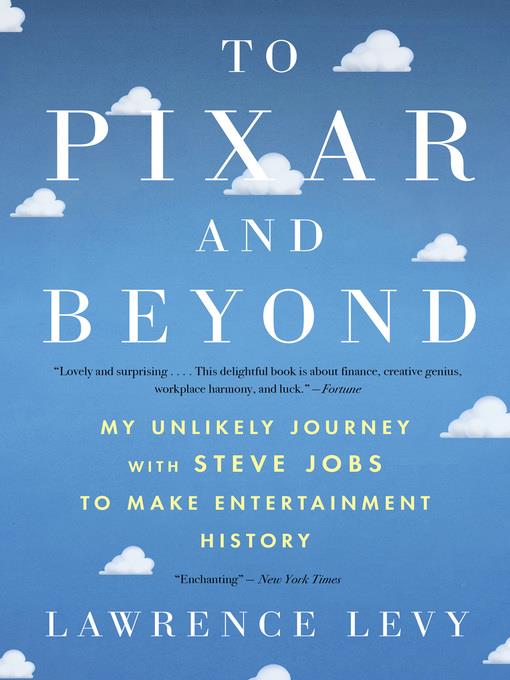
To Pixar and Beyond
My Unlikely Journey with Steve Jobs to Make Entertainment History
کتاب های مرتبط
- اطلاعات
- نقد و بررسی
- دیدگاه کاربران
نقد و بررسی

July 25, 2016
Levy, a former Silicon Valley attorney, recounts becoming a confidant of the late Steve Jobs in this engaging memoir. When Levy arrived at Pixar (where Jobs served as chairman) as chief financial officer in February 1995, it was a small but brilliant firm on the edge of failure, not for lack of talent—this was the creative team that had developed the cutting-edge animation behind the still-unreleased Toy Story—but from a lack of business savvy and a deep distrust of Jobs. By believing in Pixar’s future and its people, Levy explains, he and Jobs turned the tide for the struggling company, despite its deeply disadvantageous deal with Disney. The solution, Jobs and Levy realized, was an IPO to garner Pixar more capital. After Pixar’s value skyrocketed to $1.46 billion on its first day of trading and Toy Story became an unexpected success, Pixar could finally renegotiate its deal with Disney, acquiring more creative control and a larger share of the profits. A wildly successful slate of films followed, ultimately leading to the 2006 sale of Pixar to Disney for $7.6 billion. Levy has written a fascinating look at one of the most innovative companies of the early 21st century. Agent: David McCormick, McCormick Literary.

October 1, 2016
Pixars former chief financial officer turns in an insiders account of one of the worlds most influential digital media companies.Steve Jobs had made and lost a fortune by the time Levy showed up, having founded and then been ejected from Apple and gone to NeXT. In 1994, his new Pixar digital film company had chewed its way through $50 million of Jobs money with little to show for it. In part thanks to Levys legal skills and analytical powers, Jobs turned that around to become one of the wealthiest people in the world, controlling billions of dollars. The authors account of his dozen years with Jobs follows an unsurprising, almost by-the-numbers trajectory: new guy comes to embattled company, helps company face and then overcome challenges, and finds himself wealthy and powerful but unfulfilledwith the twist that, instead of becoming a celebrity chef or an around-the-world adventurer, Levy winds up a student and then teacher of Tibetan Buddhism. In between the cut-to-standard scaffolding, though, Levys account offers some pleasant moments and insights, including anecdotes on how Toy Story came into being pixel by pixel, a process that helped lure Levy into the company to begin with. (How do I know Im not simply falling for the allure of a high-tech company making a film? he asked a mentor, to which the response, in so many words, was, Dont be a schmuck and go for it.) No mere technocrat, Levy is also good on the details of digital filmmaking, as when he writes of the considerable difficulties involved in rendering skin so that it doesnt look like painted rubber: These are nuances we never think about, he observes, but they are glaringly obvious when they are missing. Thats just so, and theres not much missing herealthough there isnt much in the way of news about Jobs himself, the star of the show. A footnote to Walter Isaacsons Steve Jobs, but not a minor one.
COPYRIGHT(2016) Kirkus Reviews, ALL RIGHTS RESERVED.

June 15, 2016
Hired by Steve Jobs in 1994 as CFO and member of the office of the president of Pixar Animation Studios, Levy crafted a business strategy that helped turn the in-the-red graphics company into a multibillion-dollar entertainment studio. He's told his story to various audiences, but it was Jobs's daughter Lisa who suggested that he turn his talks into a book. With a 50,000-copy first printing.
Copyright 2016 Library Journal, LLC Used with permission.

























دیدگاه کاربران